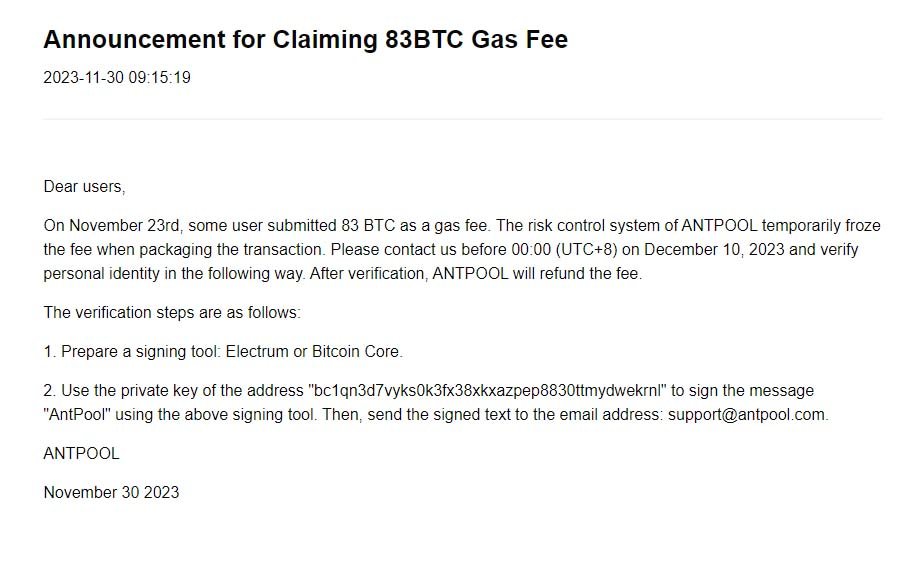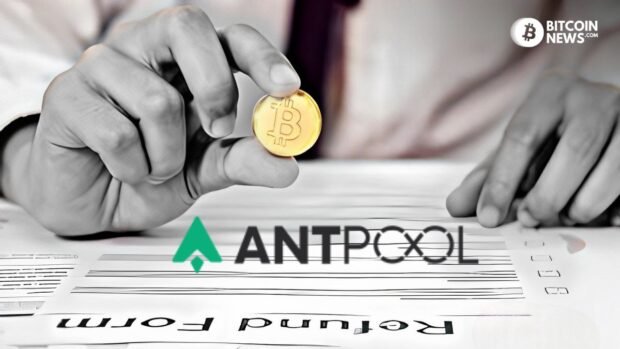In an unprecedented event within the realm of Bitcoin, AntPool, a prominent Bitcoin mining pool, recently found itself involved in a whirlwind surrounding a massive transaction fee.
What Happened?
Last week, a mysterious transaction appeared on the blockchain, submitting a staggering $3 million as fee for a Bitcoin transfer, marking the highest-ever fee recorded on the Bitcoin network. Antpool ended up mining this transaction and collecting the fees. This event sparked a frenzy, leading to discussions, speculations, and ultimately, AntPool’s decision to issue a refund.
The Transactional Mishap
The saga unfolded on November 23rd when an individual transferred his 139 BTC stash to a newly created address. Shortly after the transfer, the whole amount was swept off the address to a new wallet, paying an enormous fee of 83 BTC.
After the event, an X user signed and published a message using the private key involved in the incident, claiming he has been the victim of a hacking incident. He claimed 55 BTC were moved immediately after the transfer, to an address unknown to him.
Experts analyzing the situation came to the conclusion that the destination address was derived from a low entropy private key, and bots were waiting for a transaction to that address. The victim announced that he believes he has lost the 55 BTC, but hopes he can regain the fees paid to the pool, stating: “55 BTC gone forever. 83.5 BTC to be decided.”
Reportedly, the mining pool’s risk control system promptly intervened, freezing the exorbitant fee during transaction packaging. In the end, the alleged hacker received only 55.78 BTC out of the initial 139.42 BTC transfer. The circumstances surrounding this unprecedented fee raised eyebrows and generated curiosity within the community.
AntPool’s Response and Decision to Refund
AntPool initally didn’t show any reaction to the incident. However, in a recent turn of events, the mining pool publicly declared its intention to reimburse the $3 million fee to the rightful owner.
However, there is a certain condition for the refund: verification of ownership by the sender. To initiate this process, AntPool set a deadline for the user to prove ownership before December 10th, emphasizing the need for proper validation to avoid any potential mishaps.

The verification process outlined by AntPool involves the sender’s confirmation of ownership through the utilization of Bitcoin wallets such as Electrum or Bitcoin Core. The user is required to sign a specific message referencing AntPool using the Bitcoin signing tool, employing the private key of the transaction’s originating address. This method ensures the verification of the rightful owner without disclosing their identity to the public.
Similar Incidents
This incident is similar to another occurrence involving Paxos, where a digital-asset infrastructure provider overpaid a $500,000 mining fee due to an error. In contrast to AntPool’s approach, F2Pool swiftly agreed to return the funds to Paxos upon request, receiving appreciation for their responsiveness and understanding of occasional user errors.
Speculations and Community Response
Observers and experts speculated about the nature of this huge fee incident. Theories ranged from coding mishaps to potential hacking attempts or unauthorized access to the wallet. AntPool’s careful approach towards validating ownership underlines the complexity of handling such substantial sums within the Bitcoin landscape.
As the sender’s verification deadline approaches, the $3 million transaction fee issue highlights the complexities and challenges in the Bitcoin world. AntPool’s promise to refund the huge fee and its required condition, underscores the vital role of owning ones own keys.












